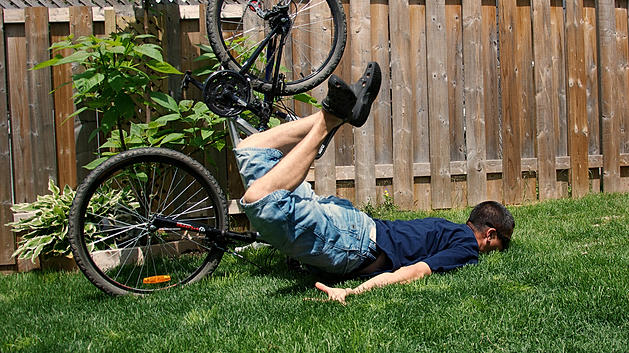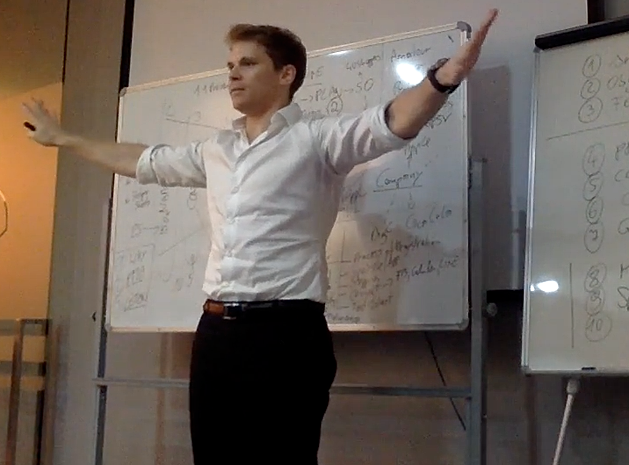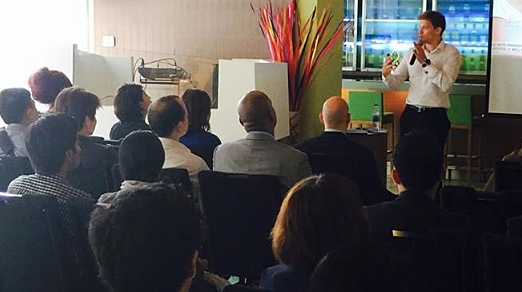If you do not know much about me or I haven't been talking to you much about my upcoming book, you might be wondering why I wrote it, or what is it all about? 25 stories... so what? Fair question... so let me explain briefly:
Think of your very first bicycle ride - when your mom or dad put you on that bike and got you going for the first time! I would imagine that you did not get very far and fell over. But even though it was your first time, did something major happen to you? Most probably not, and the reason for that is quite simple: Your parents anticipated that you might fall. They had experienced it enough themselves and so just after they put you on your bike and gave you a push they were chasing after you ready to catch you if you fell. Most likely they even gave you a helmet… just in case… Yes, you might have fallen, but your parents where there to catch you and your helmet protected you, even though you probably weren’t going very fast anyway. Eventually, pretty much all of us survived our first bike run without many scratches.

So, what’s my point here? Well, whenever I think of that story, that most of us experienced as children and then maybe even again as parents, it makes me wonder, why in that case did we prepare ourselves properly, but in so many other cases we don’t? Like, for example, do you remember the first time you invested money into something? You lost it, didn't you? Your first love? Broke your heart? The first horror movie that made you afraid of clowns? The first time you had to speak in front of a group of people and you blushed and couldn’t get a word out? You could have been well prepared, but you probably didn’t wear your “helmet” or have your parents running after you to protect you. We do learn from these experiences through positive feedback: when something works out, we do it again. The same is true for negative outcomes: you get hurt and stop doing that activity afterwards. The examples I have been giving above are quite easy and straightforward ones, and I could elaborate on school choices, the sports you play, the job you work in, or the life partner you choose.
So why not improve the whole learning process like in the bicycle story? “What if there was a “helmet”? What if there was the possibility for people to avoid making all their mistakes by themselves over and over again, but could instead learn from other people, who had made these mistakes already before?” The result would be that one would avoid crashing all together, or simply only trip, without serious injury. Crashing in that context is just a figure of speech, of course. So, how do we learn to “crash better”? There are around a million, “Self Development” books out there and even more articles on the Internet named, for example, “The ten most important things to avoid as a teenager”. I have read many of them, but probably just like with many other people, the points these books try to get across, hardly ever stick. They are too factual and I can’t relate to them well enough to remember them long term. Yes, a tip like: “Always save 10% of your income” sounds great, but you know what? The month after I read it, I am spending a 100% of my money again and nothing is left over. Feel the same way? Even though you have just read about something in one of these “Self Development” books the month before, it does not even stay with you after such a short time. So after some contemplating, I figured there must be a better way

During my business development work we had one key lesson to increase sales: “Facts tell, Stories sell!” Customers would not buy the product you were selling directly, no matter how good it was. Rather, they were buying your story about the product and only through relating to that story they would actually buy the product afterwards. It always sounded a bit strange when we taught that to new sales people, but everyone knew it was working. Translating that into the problems I was facing (and probably millions of other people out there as well) it would mean that for me to actually learn and become more prepared for life, I had to tell a story about the problem, and explain the lessons I derived from that experience afterwards. Otherwise, it would not stick, and I would not be “wearing a helmet”. Think about it! What was the last YouTube Video you watched, podcast you listened to or event you attended? What did you take away from it? It is probably a story that teaches a lesson, am I right? Take a second, and think back! It is not the fact itself; it is the attached story that gets you to remember it. Based on that idea I started giving little talks for the company I was working with. I started sharing stories and I gave tips based on what I had experienced. The feedback was great and these little talks turned into larger presentations and then even keynote speeches in many countries all over the world, such as Europe, the US, Hong Kong, Singapore, Thailand and several others. I began to realize how much a simple but well-structured story inspired people, as long as I included the lessons to take away from it afterwards. Just like myself, people started to better relate to what was being explained to them. The lessons started to stick, but not because of the lessons themselves, but rather because of the stories that they could relate to and put themselves into.

Over the years I have given so many talks that I developed a list of all the stories that I had ever shared. This was very helpful because before an event I could speak to the organizer about the type of audience and content they expected. Then, in 40-45 minutes I could share the three to four stories that fit the best. This list had grown quite extensively and so at some point I wondered: “Wouldn’t it be way more powerful if more people could listen to ALL of the stories rather than just a few during an event? Maybe a few people in the room would need to hear those three stories and someone else three others!” So, I created a final list of 25 of my most powerful and helpful stories that I would have loved to send to my younger self in a time capsule. This is how the book’s title “25 stories I would tell my Younger Self” was born. While reading these 25 stories, you will see many parallels to things that have happened or will happen in your own life. You will realize that it is not about my story being so unique, but I want these stories to inspire you to take away the key messages and adapt them to your own stories. We all share many similar values, beliefs or merits and so, even though a story may be unique in itself to you or me, we can learn valuable insights by looking at the path other people have walked before us and where it eventually led them.
Many people ask me, if I had been given this book from a Future Self, would I have made no mistakes afterwards? Of course not – I would have still made hundreds! I would have just learned faster from my mistakes or have been better prepared – that is really important to understand. It is not about NOT making mistakes; it is about understanding that every decision in life is a choice - whether you say “yes” or “no”. And, each choice has consequences – many times unforeseeably huge ones. It is not about worrying which choice is the right one - it is just about understanding how to be prepared and make the most out of every choice. You might be experiencing different stories in your life, but that is not the point. It is about learning from my experiences, so you can implement them into yours. If I manage to achieve just one thing with this book, I would love the reader to understand this law of “cause and effect”: if you want to end up where someone else ended up, take the same path! And if you want to end up somewhere else, take a different path! It is one of the simplest rules in life. But despite that simplicity, so few people actually follow it. In the next 25 stories I will show you many paths I took, and if you like the resulting outcomes, walk the same paths as well. If you don’t want to end up where I ended up, choose different ones. This is the main lesson to take away.

Some of the concepts and ideas will be new or challenging to you, so remember that your mind is like a parachute: It only works if it is open! Hope that makes sense, and if you have any questions, let me know below!
Cheers,
Never miss out on an important update in our Newsletter: www.25stories.org/updates
Follow us on Facebook for more info: www.facebook.com/25stories
We post on Twitter a couple of times a day: www.twitter.com/25_stories
See beautiful pictures on Instagram: www.instagram.com/25stories
No comments:
Post a Comment